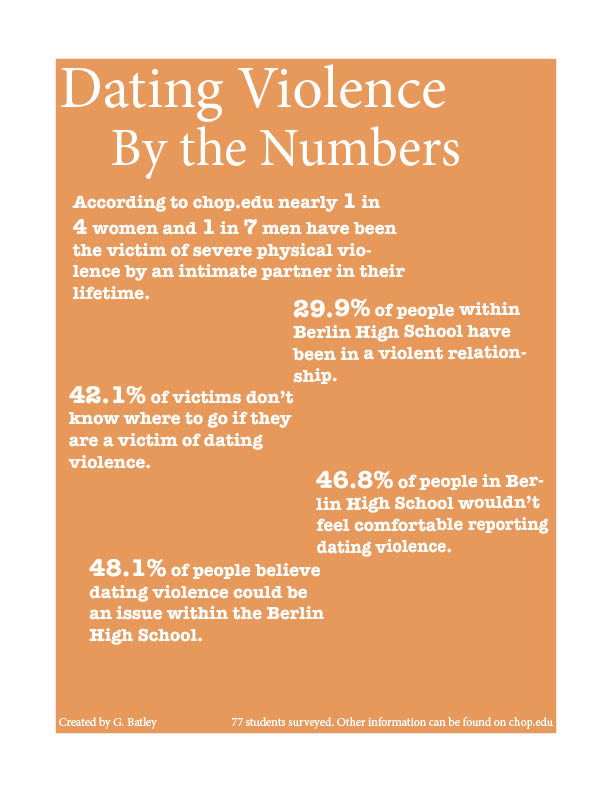Dating violence prominent issue amongst teens
February 26, 2021
Putting oneself into the shoes of a victim of dating violence can be difficult, but many teens are forced into those shoes. Dating violence is a popular issue amongst teens. Around one in three teens is affected by at least one form of dating violence according to chop.edu. There are three major different forms of dating violence; physical, emotional, and sexual.
Physical dating violence is when there is an aggressive physical action inflicted upon the other individual in the relationship. This includes hitting, punching, slapping, shoving and kicking among other things as well.
Emotional dating violence is when one of the partners in the relationship uses aggressive tones, manipulation and/or is controlling. This also includes using social platforms such as Facebook or Instagram to negatively affect one’s mental health.
Sexual dating violence is when a partner in the relationship forces a sexual action onto the other without consent. Sexual abuse can still occur after having consensual sex. Non consensual sex is still non consensual, even if the partners have done those acts together prior to that moment.
Dating violence has a sort of script to it. Family and consumer education teacher Whitney Keyes explains this in her dating violence unit.
“There is a cycle of violence where they talk about how it escalates; abuse happens, then there’s a period of peace or calmness, then it happens over and over again until the victim leaves the relationship and breaks the cycle,” Keyes said.
The only way to end the cycle of abuse is to leave the relationship. It is also important to speak to someone about what a victim might be going through, whether that be a friend or a trusted adult. Communication is very important.
“I would start with a parent or guardian because they are legally responsible for you. Teachers are mandated reporters, so if we are aware of something we have to report it to the county. A guidance counselor is always a good resource. Just tell someone because if they don’t know they can’t help,” Keyes said.
When a student is reporting to anyone, but specifically within the school, it is important for them to feel that they are being heard. One way of doing so is talking to a counselor within the school about their situation.
“If you’re in the school where somebody you know went and tried to communicate their experience of dating violence and nothing happens or nobody really gave them much time, the kids are not going to be eager to come forth and open up about their relationship. I think the school can promote itself just by being open and receptive,” Counselor Matt Willett said.
Another important factor in a violent relationship is the presence of jealousy. Although jealousy is a natural emotion, taking it to an extreme is where it becomes problematic. Jealousy is an issue when it becomes about control.
“When it becomes about control that’s when it’s more of a dating violence issue than an emotion. So if you’re telling someone what to wear or you’re asking for their passwords on their phone because you don’t trust who they’re talking to that’s where it’s becoming more about control. If it’s all about maintaining power and control over that other person then it’s dating violence,” Keyes said.






